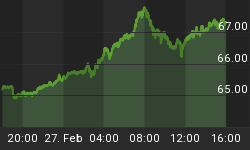Some commentators have dubbed Mr. Bernanke's latest plan as "QEnfinity" after he outlined that the Federal Reserve would purchase up to $40bn of mortgage-backed securities each month until the unemployment rate in America decreases by a "substantial" measure.
The consequences of these actions have led some commentators to state that high inflation in the U.S. is likely based on the current economic environment. It would seem that investors having faced an alternating "risk-on/risk-off" market finally have a no risk trade. Many commentators recommend buying real assets, precious metals, and stocks, to ride the coming wave of inflation.
However, whether this actually occurs is far from certain. What if the common wisdom at this point is based not on prescience, but on flawed intuition?
Daniel Kahnemann in his book "Thinking Fast, Thinking Slow," writes of the mind's preference for a coherent story over dealing with unknown or inconvenient variables. Rather than accepting that critical information is unavailable or contradictive, our mind makes a leap based on limited information to a consistent, but potentially unfounded conclusion. According to Kahnemann, a leader in the field of behavioural economics, the intuitive mind has a tendency to "intensity match", whereby the intensity of an estimated outcome is based on the intensity of a given input. For example, the public recognizes the Fed has announced a much larger QE than expected, they recall the most familiar and dramatic instances of other large monetizations that they are aware of, and intuitively conjure a result of matching intensity from those examples; in this case high inflation. The problem with this fast evaluation is that it leaves a few factors out of the analysis.
First, the Fed has left itself significant room for maneuver by stating, "...in determining the size, pace, and composition of its asset purchases, the Committee will, as always, take appropriate account of the likely efficacy and costs of such purchases." What the Fed has announced is an intention only, and what actually occurs is variable. They have not announced a defined stimulus, but a potential marginal flow that is entirely dependent on incremental changes in the economy going forward (those changes also happen to be entirely undefined). It accomplishes the goal of appearing significant, without necessarily having to be significant over an extended period of time.
Mr. Bernanke, much like the Wizard of Oz, maintains influence over his constituency only so long as the market believes he can solve their problems, not because he yields real power. The Fed is simply the largest coordinated actor in the market, which gives it the illusion of control on a marginal basis. However, from the larger perspective, the U.S. economy is still stacked with a massive stock of private and public debt that inhibits growth, large banks have still not marked their assets to market under FAS 157, and there is still in the range of $600-700 trillion of notional CDS contracts outstanding. $40bn per month of Fed purchases does not change these facts; it merely shifts a small amount of debt to a different actor. It is entirely plausible that the assets dispersed in exchange for the MBS will share the same fate as previous QE endeavours: to sit as reserves for capital impaired banking institutions like Morgan Stanley and JP Morgan.
Some commentators may be correct; "all in" monetization may be the goal. However, if this happens it will not occur in vacuum. The U.S. bond market is $32+ trillion dollars. The Fed does not dictate yields, the market does, and it is unlikely (but not impossible) that either corporate or government bondholders would sit idly by and watch the value of their investments evaporate due to long term Fed induced inflation. A rise in market interest rates would likely result if high inflation occurred, and no one would particularly care for the Fed's opinion on the "correct" interest rate at that point. This would be a deflationary event, as it would result in a loss of purchasing power of U.S. dollar denominated debt. It would be game over for Mr. Bernanke and the Fed, as the massive debt levels in the economy could no longer be financed at higher interest rates, and the Fed's purchased assets would likely face a drop in value.
Even if one assumes that the bondholders will accept high, sustained inflation and sit tight, and the stimulus makes it to the broader economy to inelastic goods like oil as the common wisdom suggests, this does not mean that inflation can necessarily be sustained. An increase to oil and other input prices vital for economic growth would act as a tax on international trade, defeating the intentions of easing in the first place and risking further economic deterioration.
Unless the goal of Mr. Bernanke is to destroy his own institution, and its illusion of control, there appears to be good reason to question whether the Fed's MBS purchase operations will continue alongside sustained high inflation.















